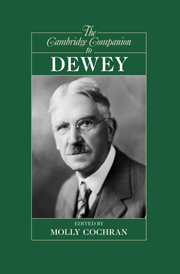Book contents
- Frontmatter
- Introduction
- 1 The making of a democratic philosopher: the intellectual development of John Dewey
- 2 Dewey’s epistemology
- 3 The naturalism of John Dewey
- 4 Dewey’s logic of inquiry
- 5 The primacy of practice in Dewey’s experimental empiricism
- 6 Cognitive science and Dewey’s theory of mind, thought, and language
- 7 John Dewey and action
- 8 Dewey’s moral philosophy
- 9 Ethics as moral inquiry: Dewey and the moral psychology of social reform
- 10 Dewey and pragmatic religious naturalism
- 11 Dewey’s aesthetics
- 12 Dewey’s philosophy of education: a critique from the perspective of care theory
- 13 Dewey’s vision of radical democracy
- 14 Dewey as an international thinker
- Bibliography
- Index
6 - Cognitive science and Dewey’s theory of mind, thought, and language
Published online by Cambridge University Press: 28 September 2010
- Frontmatter
- Introduction
- 1 The making of a democratic philosopher: the intellectual development of John Dewey
- 2 Dewey’s epistemology
- 3 The naturalism of John Dewey
- 4 Dewey’s logic of inquiry
- 5 The primacy of practice in Dewey’s experimental empiricism
- 6 Cognitive science and Dewey’s theory of mind, thought, and language
- 7 John Dewey and action
- 8 Dewey’s moral philosophy
- 9 Ethics as moral inquiry: Dewey and the moral psychology of social reform
- 10 Dewey and pragmatic religious naturalism
- 11 Dewey’s aesthetics
- 12 Dewey’s philosophy of education: a critique from the perspective of care theory
- 13 Dewey’s vision of radical democracy
- 14 Dewey as an international thinker
- Bibliography
- Index
Summary
Over eighty years ago, half a century before the term “cognitive science” had even been coined, John Dewey developed his view of mind, thought, and language in ongoing dialogue with the biological and psychological sciences of his day. He drew on empirical research in a number of fields, including biology, neuroscience, anthropology, cognitive psychology, developmental psychology, social psychology, and linguistics. Dewey's approach thus offers a model of how philosophy and the cognitive sciences can productively work together. The sciences reveal aspects of the deepest workings of the mind. Philosophy evaluates the underlying assumptions and methods of the sciences, and it places the empirical research on cognition in its broader human context, in order to determine what it means for our lives. In a nutshell, Dewey's theory of mind is naturalistic, non-reductive, and process-oriented. His view is naturalistic in that it employs empirical research drawn from a number of natural and social sciences. It eschews explanations that rely on supernatural notions, rejecting any idea of a non-empirical ego or pure rationality. However, even though Dewey appropriated modes of inquiry characteristic of the sciences, he took great care to avoid the reductionist tendencies that limit the explanatory scope of certain sciences.
- Type
- Chapter
- Information
- The Cambridge Companion to Dewey , pp. 123 - 144Publisher: Cambridge University PressPrint publication year: 2010
- 22
- Cited by

